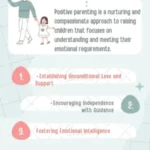Discipline is an essential aspect of parenting that lays the foundation for a child’s character development. Effective discipline goes beyond punishment and control; it focuses on teaching valuable life skills and building a strong moral compass in children.. This article delves into diverse disciplinary strategies that not only mold a child’s conduct but also foster self-discipline, empathy, and accountability.
The Importance of Effective Discipline
Discipline is not about stifling a child’s individuality or forcing them to comply blindly; rather, it is about guiding them towards making informed choices and understanding the consequences of their actions. Effective discipline sets boundaries and expectations while providing children with the tools they need to become responsible and compassionate individuals.
Leading by Example
Children draw profound lessons from observing their parental figures. Demonstrating the desired behavioral traits is among the most efficacious means to inculcate discipline. Acts of kindness, empathy, and respect exhibited in daily interactions can profoundly influence their imitation of these virtues.
Read also: The Art of Discipline: A dedicated Path to Positive Behavior
Clear and Consistent Expectations
A child thrives when endowed with crystal-clear, age-appropriate expectations, consistently conveyed. Providing a definite framework of acceptable conduct empowers them to make well-informed decisions.
Positive Reinforcement
Positive reinforcement entails recognizing and commending a child’s virtuous behavior. Celebrating their achievements, efforts, and benevolent gestures nurtures their self-esteem and fuels their commitment to upholding these positive attributes.
Natural Consequences
Permitting children to confront the natural consequences of their actions bestows invaluable lessons. A cognizance of the direct correlation between deeds and outcomes instills responsibility and accountability.
Time-In Instead of Time-Out
Eschewing isolation through time-outs, an alternative approach of “time-ins” can be adopted. Engaging with the child, discussing their actions and emotions, fosters candid communication and deeper emotional understanding.
Teaching Problem-Solving Skills
Encouraging children to surmount challenges and find solutions develops resilience and critical thinking skills.
Empathy and Understanding
Cultivation of empathy entails sensitizing children to understand and consider others’ emotions. Empathetic children display heightened compassion and are less inclined towards harmful behaviors.
Logical Consequences
Logical consequences are intrinsically linked to a child’s actions, aimed at instilling profound lessons. For instance, breaking a toy might necessitate saving allowance to acquire a replacement, fostering opportunities for growth and learning.
Active Listening
Being an attentive listener when a child communicates their thoughts and emotions conveys the value placed on their feelings and nurtures open expression.
Rewarding Effort and Improvement
Commendation of not only accomplishments but also the endeavor and progress made by the child encourages a growth-oriented mindset and a willingness to explore novel avenues.
Conclusion
Effective parental discipline holds immense potential in shaping a child’s character. Employing constructive and positive approaches, parents can steer their offspring towards responsible decision-making, comprehension of the consequences of their deeds, and the cultivation of empathy and compassion. Discipline, as a nurturing process, profoundly influences a child’s emotional and ethical development, molding them into self-assured, courteous, and empathetic individuals.





